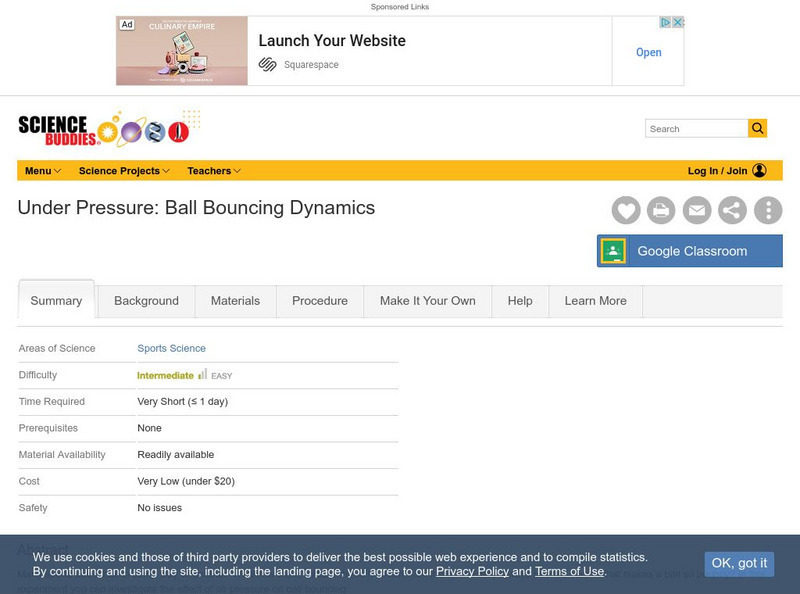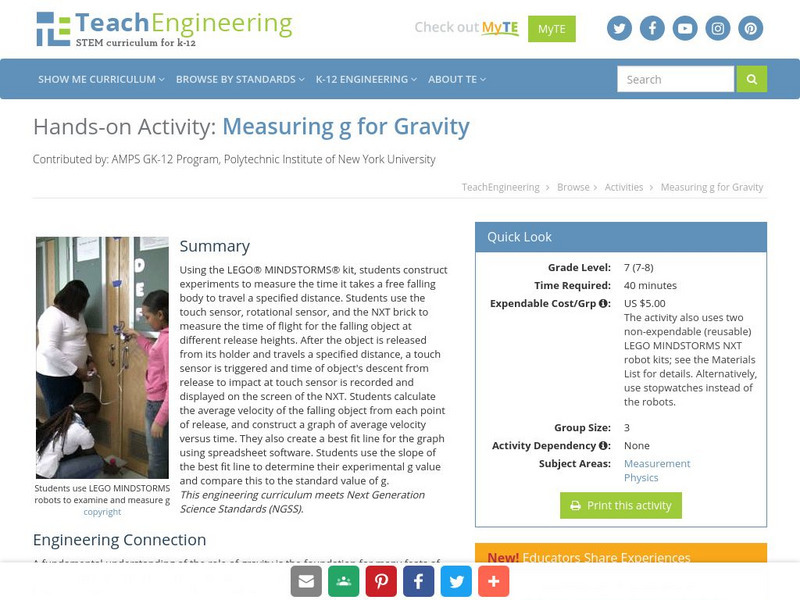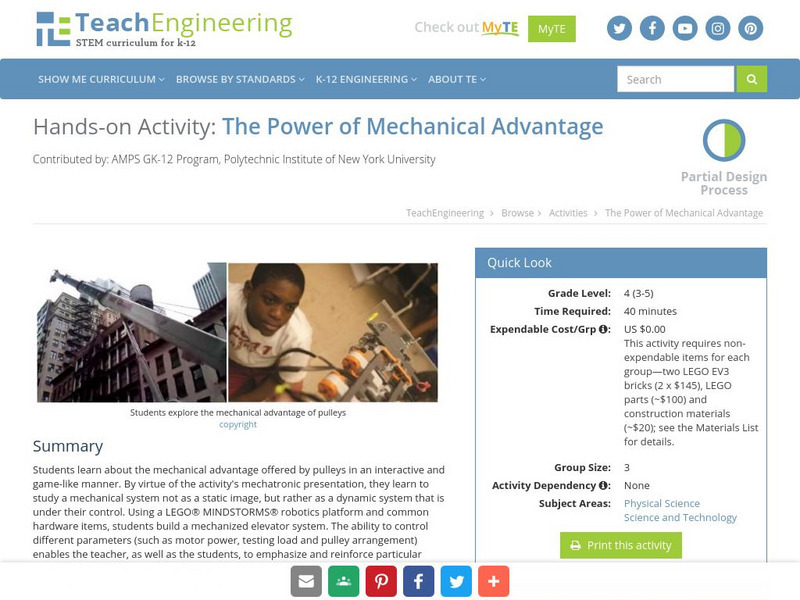Curated OER
The Way Things Fall
Students see that light and heavy objects fall at the same rate, as established experimentally by Galileo. They see that falling objects, and balls rolling down an incline, tend to accelerate at a constant rate a. Their velocity...
Curated OER
Balancing Act: Olympics, Winter Sports, Ice Skating, Gravity, Physics, Science
Young scholars, by way of the Olympic Games event of ice skating, are introduced to the concepts of gravity. They try some hands-on gravity experiments and explore the concept of gravity through art.
Curated OER
Weightlessness
Students use a coffee cup to demonstrate weightlessness. After a lecture/demo, students read an article on free-fall. They perform a simple experiment which helps them explain the concept of weightlessness.
Curated OER
Black Hole Lesson
Tenth graders experiment with detection techniques for black holes by modeling the rotation of galaxies with larger and larger masses in the center. They discover while some events cannot be directly observed they may be observable in...
Curated OER
Physics Unit 8: 1
In this physics unit 8 worksheet, students construct a qualitative motion map as it relates to centripetal force of a described scenario. Students respond to questions as it relates to acceleration and the magnitude of the centripetal...
Curated OER
Weightlessness
Students predict the behavior of coffee in a cup while it is dropped during a demonstration. They relate their observations to the weightless conditions that astronauts experience in space and discuss the concept of free-fall.
Curated OER
From Caterpillar to Butterfly
Students read and discuss the book about the butterfly and create their own butterflies using liquid watercolors and pipe cleaners. They then create a butterfly development book, included in the lesson, and color the pictures using...
Curated OER
The Elastic Racquet
Young scholars use this introductory lab using a tennis racquet, however it is very difficult to study because of the strings and the racquet stretch so little and so quickly during a match that students were unable to make simple...
Curated OER
Lesson-Mass and Weight
Student identify the three stationary positions, on the Earth, on the Moon, and in a house floating atop the cloud layers of Jupiter. They also identify the three orbiting positions, orbiting the Earth, orbiting the Moon, and orbiting...
Curated OER
How Do Things Fall?
Students observe falling objects. They discover the rate of falling is based on air resistance and not the weight of the objects. They discuss how engineers use this type of information to design aerodynamic shapes.
Curated OER
Perching Parrot
Students explore the concepts of center of mass and static equilibrium by seeing how non-symmetrical objects balance. They also analyze why all forces on an object must cancel out exactly for an object to be stationary.
Curated OER
Pine Wood Derby Prompt
Eighth graders use Newton's Laws of Motion to assist a troop in making a winning car in the Pine Wood Derby.
Curated OER
Earth's Orbit Lesson
Tenth graders devise a computational model to explore how the orbit of the Earth might change if its velocity were different. Using accurately recorded data, 10th graders defend a scientific argument.
Exploratorium
Exploratorium: Skateboard Science
This site is on the science and art of skateboard design, including equipment, tricks, glossary of terms, and a live webcast of a skateboard performance.
Science Buddies
Science Buddies: Under Pressure: Ball Bouncing Dynamics
Many sports use a ball in some way or another. We throw them, dribble them, hit them, kick them, and they always bounce back. What makes a ball so bouncy? In this experiment you can investigate the effect of air pressure on ball bouncing.
Other
Simple Science: Muscle Loss in Space
Learners investigate the effects of zero gravity. The resource has students measure the change in the area of calf muscle from before and after the flight to determine if muscle loss has occurred. Some topics included are muscle loss,...
Vision Learning
Visionlearning: An Experiment: Acceleration During Free Fall
Animated simulation re-enacts Galileo's experiment of dropping objects off the Leaning Tower of Pisa.
TeachEngineering
Teach Engineering: Measuring G
Using the LEGO MINDSTORMS NXT kit, students construct experiments to measure the time it takes a free falling body to travel a specified distance. Students use the touch sensor, rotational sensor, and the NXT brick to measure the time of...
TeachEngineering
Teach Engineering: The Power of Mechanical Advantage
Students learn about the mechanical advantage offered by pulleys in an interactive and game-like manner. By virtue of the activity's mechatronic presentation, they learn to study a mechanical system not as a static image, but rather as a...
TeachEngineering
Teach Engineering: The Stress That You Apply
Students learn about contact stress and its applications in engineering. They are introduced to the concept of heavy loads, such as buildings, elephants, people and traffic, and learn how those heavy loads apply contact stress. Through...
PBS
Pbs Nova: Relativity and the Cosmos
This well-written explanation of relativity includes animations and pictures which may be helpful in understanding a tough topic.
PBS
Pbs Learning Media: Centripetal Force: Roller Coaster Loops
This video segment explains centripetal force and illustrates how roller coasters rely on it to give you a thrilling ride. Includes background reading material and discussion questions. [4:40]
Utah Education Network
Uen: Weighing In
Activity investigates weight and its relationship to gravity.























